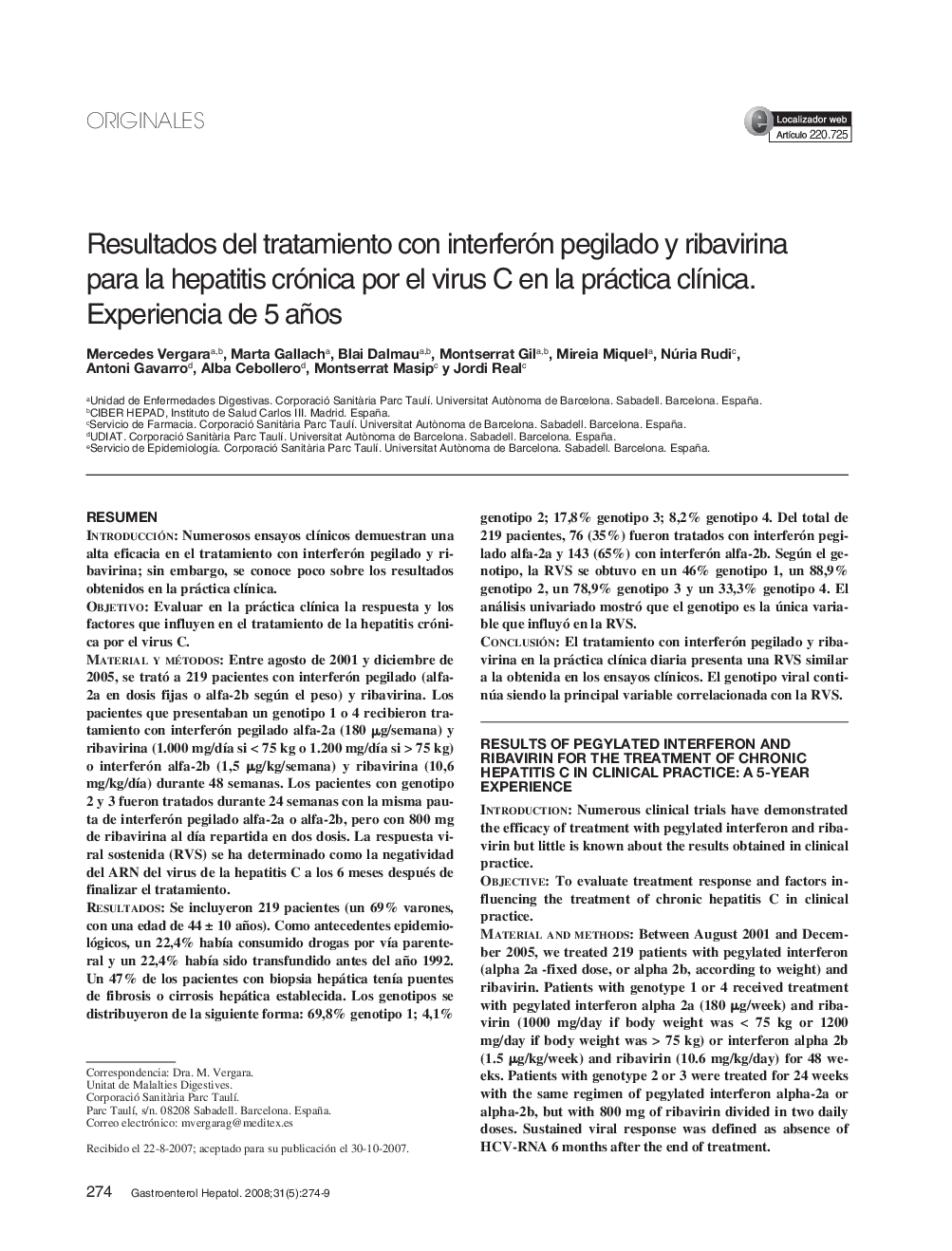| کد مقاله | کد نشریه | سال انتشار | مقاله انگلیسی | نسخه تمام متن |
|---|---|---|---|---|
| 3289149 | 1209553 | 2008 | 6 صفحه PDF | دانلود رایگان |

ResumenIntroducciónNumerosos ensayos clínicos demuestran una alta eficacia en el tratamiento con interferón pegilado y ribavirina; sin embargo, se conoce poco sobre los resultados obtenidos en la práctica clínica.ObjetivoEvaluar en la práctica clínica la respuesta y los factores que influyen en el tratamiento de la hepatitis crónica por el virus C.Material y métodosEntre agosto de 2001 y diciembre de 2005, se trató a 219 pacientes con interferón pegilado (alfa-2a en dosis fijas o alfa-2b según el peso) y ribavirina. Los pacientes que presentaban un genotipo 1 o 4 recibieron tratamiento con interferón pegilado alfa-2a (180 |xg/semana) y ribavirina (1.000 mg/día si < 75 kg o 1.200 mg/día si > 75 kg) o interferón alfa-2b (1,5 μg/kg/semana) y ribavirina (10,6 mg/kg/día) durante 48 semanas. Los pacientes con genotipo 2 y 3 fueron tratados durante 24 semanas con la misma pauta de interferón pegilado alfa-2a o alfa-2b, pero con 800 mg de ribavirina al día repartida en dos dosis. La respuesta viral sostenida (RVS) se ha determinado como la negatividad del ARN del virus de la hepatitis C a los 6 meses después de finalizar el tratamiento.ResultadosSe incluyeron 219 pacientes (un 69% varones, con una edad de 44 ± 10 años). Como antecedentes epidemiológicos, un 22,4% había consumido drogas por vía parenteral y un 22,4% había sido transfundido antes del año 1992. Un 47% de los pacientes con biopsia hepática tenía puentes de fibrosis o cirrosis hepática establecida. Los genotipos se distribuyeron de la siguiente forma: 69,8% genotipo 1; 4,1% genotipo 2; 17,8% genotipo 3; 8,2% genotipo 4. Del total de 219 pacientes, 76 (35%) fueron tratados con interferón pegilado alfa-2a y 143 (65%) con interferón alfa-2b. Según el genotipo, la RVS se obtuvo en un 46% genotipo 1, un 88,9% genotipo 2, un 78,9% genotipo 3 y un 33,3% genotipo 4. El análisis univariado mostró que el genotipo es la única variable que influyó en la RVS.ConclusiónEl tratamiento con interferón pegilado y ribavirina en la práctica clínica diaria presenta una RVS similar a la obtenida en los ensayos clínicos. El genotipo viral continúa siendo la principal variable correlacionada con la RVS.
IntroductionNumerous clinical trials have demonstrated the efficacy of treatment with pegylated interferon and ribavirin but little is known about the results obtained in clinical practice.ObjectiveTo evaluate treatment response and factors influencing the treatment of chronic hepatitis C in clinical practice.Material and methodsBetween August 2001 and December 2005, we treated 219 patients with pegylated interferon (alpha 2a -fixed dose, or alpha 2b, according to weight) and ribavirin. Patients with genotype 1 or 4 received treatment with pegylated interferon alpha 2a (180 μg/week) and ribavirin (1000 mg/day if body weight was < 75 kg or 1200 mg/day if body weight was > 75 kg) or interferon alpha 2b (1.5 μg/kg/week) and ribavirin (10.6 mg/kg/day) for 48 weeks. Patients with genotype 2 or 3 were treated for 24 weeks with the same regimen of pegylated interferon alpha-2a or alpha-2b, but with 800 mg of ribavirin divided in two daily doses. Sustained viral response was defined as absence of HCV-RNA 6 months after the end of treatment.ResultsA total of 219 patients were included (69% men; mean age 44 ± 10). As epidemiological antecedents, 22.4% of the treated patients had previously consumed drugs parenterally and 22.4% had received blood transfusions before 1992. Forty-seven percent of the patients with liver biopsy had fibrosis bridges or established liver cirrhosis. The genotype was distributed as follows: 69.8% genotype 1, 4.1% genotype 2, 17.8% genotype 3, and 8.2% genotype 4. Of the 219 patients, 76 (35%) were treated with pegylated interferon alpha 2a and 143 (65%) with interferon alpha 2b. Analysis of response by genotype revealed that sustained viral response was obtained in 46% genotype 1, 88.9% genotype 2, 78.9% genotype 3, and 33.3% genotype 4. Univariate analysis showed that the only variable influencing sustained viral response was genotype.ConclusionTreatment with pegylated interferon and ribavirin in clinical practice shows a similar pattern of sustained viral response to that obtained in clinical research. The main variable correlated with sustained viral response continues to be viral genotype.
Journal: Gastroenterología y Hepatología - Volume 31, Issue 5, May 2008, Pages 274–279